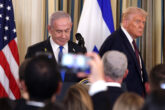October 04, 2016
Don't Shoot Iran's Naval Provocateurs
America has learned how to defuse these situations.
In recent weeks, Iranian ships have harassed a number of American vessels in the crowded waters of the Persian Gulf. Republican presidential nominee Donald Trump has responded that if such actions continued under his presidency, Iranian ships would be “shot out of the water.”
Such an approach would send a strong signal, but would also likely turn a minor incident into a significant international crisis, causing oil prices to skyrocket and potentially embroiling America in another major conflict in the Middle East. Fortunately, the United States has a number of options at its disposal that do not come with this type of risk, and that have proven in the past to be effective in deterring provocative Iranian behavior.
From a defensive standpoint, threatening to close the Strait of Hormuz is Iran’s most effective form of conventional deterrence against conventional attacks. Closing the passageway through which 20 percent of the world’s oil production flows is the closest thing Iran has to a nuclear option. Just like the use of nuclear weapons, actually closing the strait would be suicidal for Iran’s navy, leading to an American-led international military response while also doing grave damage to Iran’s ability to export oil through the strait. But reminding its competitors, including Saudi Arabia, Israel and the United States, that it has the capacity to set off a world economic crisis if attacked is useful to Iran.
Read the full article in The National Interest.
More from CNAS
-
Transatlantic Security / Middle East Security
The Russia-Iran Partnership: A Geopolitical Balancing ActIt has been almost a year since Russia and Iran signed their comprehensive strategic partnership. That deal established a 20-year partnership between the two countries coverin...
By Andrea Kendall-Taylor & Jim Townsend
-
Transatlantic Security / Middle East Security / Energy, Economics & Security
Sanctions Aren’t Enough to Shut Down the Moscow-Tehran Black Market for WarThe geographic scope and extent of Iranian-Russian cooperation highlights the failure of traditional sanctions to prevent Moscow and Tehran from seeking key components like ch...
By Delaney Soliday
-
How a Peace Deal Between Hamas and Israel Will Reshape the Middle East
Rachel Brandenberg joins NPR to discuss how the region will change if Israel and Hamas continue to abide by the peace deal President Trump brokered. Listen to the interview o...
By Rachel Brandenburg
-
Donald Trump’s Gaza Plan Skips Step One
The White House proposal attempts to solve too many distinct issues all at once, without enough input from Palestinians....
By Delaney Soliday




